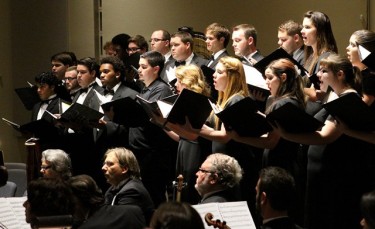Review by Doug Carroll
GCU News Bureau
In only three years’ time, Grand Canyon University’s spring choral concert has become a circle-the-date occasion for serious music lovers.
Last year, Felix Mendelssohn’s majestic “Elijah” brought soprano Amber Wagner back to campus for a concert that set a new standard for the choral program under the direction of Dr. Juan Hernandez, assistant dean of the College of Fine Arts and Production.
Little did we know then that the 100-voice Choral Union was capable of scaling even greater heights.
Tuesday night’s “In Memoriam Sandy Hook” concert, comprised of three works, provided a somber-but-powerful exploration of the web of emotions surrounding tragedy. And while that might not seem particularly uplifting, the Choral Union and the 28-voice Canyon Singers rendered a performance of such extraordinary beauty and depth that audience members at First Southern Baptist Church departed into the evening in awe of what they had just heard.
The concert was dedicated to the 20 children and six adults who died in a shooting last December at Sandy Hook Elementary School in Newtown, Conn.
A captivating “When David Heard,” written by American composer Eric Whitacre only 14 years ago and performed a cappella by the Canyon Singers under the direction of Dr. Sheila Corley, expressed the agony of King David upon learning of the death of his son Absalom (2 Samuel 18:33). The rests in the music have the effect of sounding like pauses between sobs of grief, giving parents in the audience an opportunity to reflect on the heartache of losing a child — as parents in Newtown experienced last winter and others in Boston did only last week.
That proved to be only an appetizer, however, as the Choral Union then took the stage for Gabriel Fauré’s “Requiem in D minor, Op. 48” and Ralph Vaughan Williams’ “Dona Nobis Pacem,” accompanied by orchestra players from the Phoenix Symphony.
The 35-minute “Requiem,” sung in Latin in seven movements, has been described as a “lullaby of death” for its exquisite beauty and is a setting of the Roman Catholic Mass for the Dead. The work was written in the late 19th century by Fauré, considered one of France’s greatest composers, and performed at his own funeral in 1924.
Fauré called it “an aspiration toward happiness above,” and the highest points came in arias by bass Christopher Herrera, a GCU voice instructor, and Chelsey Minkler, a junior who is extending the tradition of fine soprano voices at the University. The diminutive Minkler, who sang the centerpiece “Pie Jesu,” first came to campus-wide attention in the one-act opera “Beauty and the Beast” last fall.
She has the perfect mentor in Corley, who coached Wagner and Christina Cullers — and showed Tuesday that she still can carry a performance herself.
Corley sang the haunting “Agnus Dei” in “Dona Nobis Pacem” (which means “give us peace”). The five-part cantata, raging thunder set to words by Walt Whitman and John Bright, was written by the Englishman Williams in 1936 in light of recent wars — and in fear of a new one.
“This reflects the struggle we all have, this tremendous desire for peace,” Hernandez said in introducing the 30-minute work. “It erupts into an outcry, a screaming for God’s peace.”
The work’s coda, sung a cappella by Corley and the massive choir, brought “Dona Nobis Pacem” and the concert to a graceful, poignant conclusion that supplied a splendid musical definition of peace.
Contact Doug Carroll at 639.8011 or [email protected].




































































